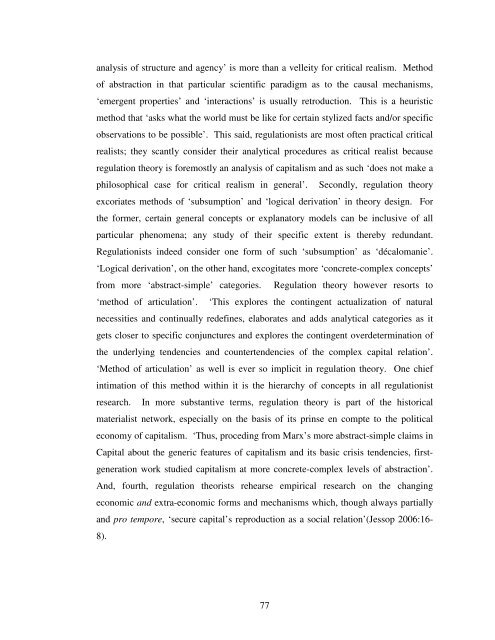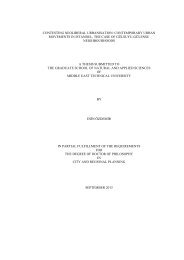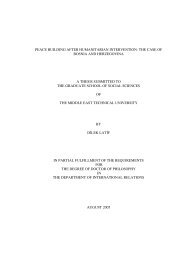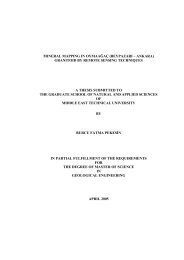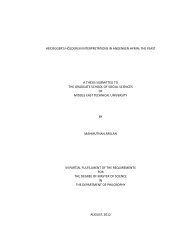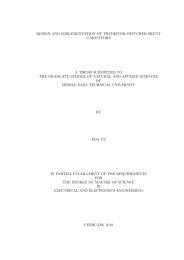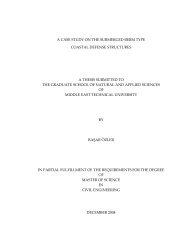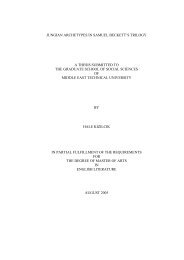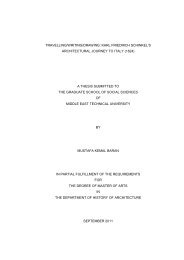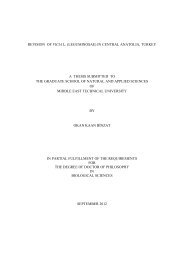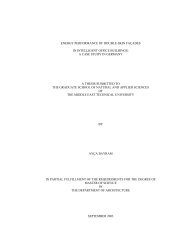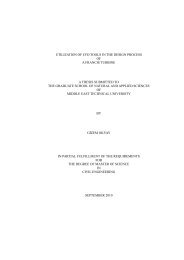View Original - Middle East Technical University
View Original - Middle East Technical University
View Original - Middle East Technical University
You also want an ePaper? Increase the reach of your titles
YUMPU automatically turns print PDFs into web optimized ePapers that Google loves.
analysis of structure and agency’ is more than a velleity for critical realism. Method<br />
of abstraction in that particular scientific paradigm as to the causal mechanisms,<br />
‘emergent properties’ and ‘interactions’ is usually retroduction. This is a heuristic<br />
method that ‘asks what the world must be like for certain stylized facts and/or specific<br />
observations to be possible’. This said, regulationists are most often practical critical<br />
realists; they scantly consider their analytical procedures as critical realist because<br />
regulation theory is foremostly an analysis of capitalism and as such ‘does not make a<br />
philosophical case for critical realism in general’. Secondly, regulation theory<br />
excoriates methods of ‘subsumption’ and ‘logical derivation’ in theory design. For<br />
the former, certain general concepts or explanatory models can be inclusive of all<br />
particular phenomena; any study of their specific extent is thereby redundant.<br />
Regulationists indeed consider one form of such ‘subsumption’ as ‘décalomanie’.<br />
‘Logical derivation’, on the other hand, excogitates more ‘concrete-complex concepts’<br />
from more ‘abstract-simple’ categories. Regulation theory however resorts to<br />
‘method of articulation’. ‘This explores the contingent actualization of natural<br />
necessities and continually redefines, elaborates and adds analytical categories as it<br />
gets closer to specific conjunctures and explores the contingent overdetermination of<br />
the underlying tendencies and countertendencies of the complex capital relation’.<br />
‘Method of articulation’ as well is ever so implicit in regulation theory. One chief<br />
intimation of this method within it is the hierarchy of concepts in all regulationist<br />
research. In more substantive terms, regulation theory is part of the historical<br />
materialist network, especially on the basis of its prinse en compte to the political<br />
economy of capitalism. ‘Thus, proceding from Marx’s more abstract-simple claims in<br />
Capital about the generic features of capitalism and its basic crisis tendencies, first-<br />
generation work studied capitalism at more concrete-complex levels of abstraction’.<br />
And, fourth, regulation theorists rehearse empirical research on the changing<br />
economic and extra-economic forms and mechanisms which, though always partially<br />
and pro tempore, ‘secure capital’s reproduction as a social relation’(Jessop 2006:16-<br />
8).<br />
77


